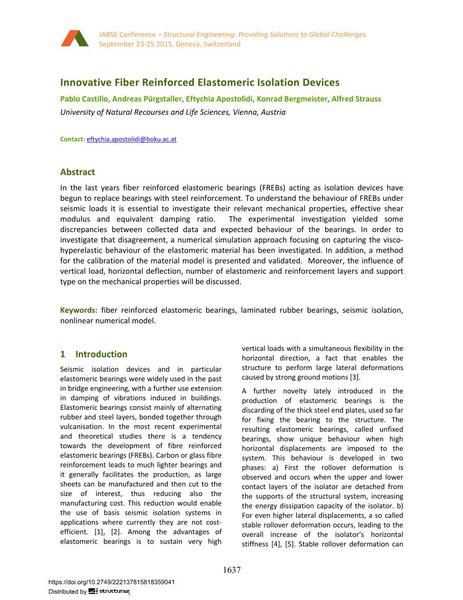Innovative Fiber Reinforced Elastomeric Isolation Devices

|
|
|||||||||||
Bibliografische Angaben
| Autor(en): |
Pablo Castillo
(University of Natural Recourses and Life Sciences, Vienna, Austria)
Andreas Pürgstaller (University of Natural Recourses and Life Sciences, Vienna, Austria) Eftychia Apostolidi (University of Natural Recourses and Life Sciences, Vienna, Austria) Konrad Bergmeister (University of Natural Recourses and Life Sciences, Vienna, Austria) Alfred Strauss |
||||
|---|---|---|---|---|---|
| Medium: | Tagungsbeitrag | ||||
| Sprache(n): | Englisch | ||||
| Tagung: | IABSE Conference: Structural Engineering: Providing Solutions to Global Challenges, Geneva, Switzerland, September 2015 | ||||
| Veröffentlicht in: | IABSE Conference Geneva 2015 | ||||
|
|||||
| Seite(n): | 1637-1644 | ||||
| Anzahl der Seiten (im PDF): | 8 | ||||
| Jahr: | 2015 | ||||
| DOI: | 10.2749/222137815818359041 | ||||
| Abstrakt: |
In the last years fiber reinforced elastomeric bearings (FREBs) acting as isolation devices have begun to replace bearings with steel reinforcement. To understand the behaviour of FREBs under seismic loads it is essential to investigate their relevant mechanical properties, effective shear modulus and equivalent damping ratio. The experimental investigation yielded some discrepancies between collected data and expected behaviour of the bearings. In order to investigate that disagreement, a numerical simulation approach focusing on capturing the visco- hyperelastic behaviour of the elastomeric material has been investigated. In addition, a method for the calibration of the material model is presented and validated. Moreover, the influence of vertical load, horizontal deflection, number of elastomeric and reinforcement layers and support type on the mechanical properties will be discussed. |
||||
| Stichwörter: |
Seismische Isolierung
|
||||
